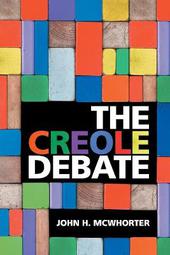
|
The Creole Debate
Paperback / softback
Main Details
| Title |
The Creole Debate
|
| Authors and Contributors |
By (author) John H. McWhorter
|
| Physical Properties |
| Format:Paperback / softback | | Pages:178 | | Dimensions(mm): Height 228,Width 151 |
|
| Category/Genre | linguistics
Historical and comparative linguistics
Grammar and syntax |
|---|
| ISBN/Barcode |
9781108450836
|
| Classifications | Dewey:496 |
|---|
| Audience | | Professional & Vocational | |
|---|
| Illustrations |
Worked examples or Exercises
|
|
Publishing Details |
| Publisher |
Cambridge University Press
|
| Imprint |
Cambridge University Press
|
| Publication Date |
17 May 2018 |
| Publication Country |
United Kingdom
|
Description
Creoles have long been the subject of debate in linguistics, with many conflicting views, both on how they are formed, and what their political and linguistic status should be. Indeed, over the past twenty years, some creole specialists have argued that it has been wrong to think of creoles as anything but language blends in the same way that Yiddish is a blend of German and Hebrew and Slavic. Here, John H. McWhorter debunks the most widely accepted idea that creoles are created in the same way as 'children', taking characteristics from both 'parent' languages, and its underlying assumption that all historical and biological processes are the same. Instead, the facts support the original, and more interesting, argument that creoles are their own unique entity and are among the world's only genuinely new languages.
Author Biography
John H. McWhorter is Associate Professor of English and Comparative Literature at Columbia University. Having written 19 books on both language and race issues, he is also a prolific voice on a number of political and social issues, with regular articles in The Wall Street Journal, The Atlantic and The New York Times.
Reviews'This eloquent and well-researched book on creole languages is the final nail to the coffin of the ideologists who claim that there is nothing special about the grammars of these languages. Chapeau!' Peter Bakker, Aarhus University, Denmark
|